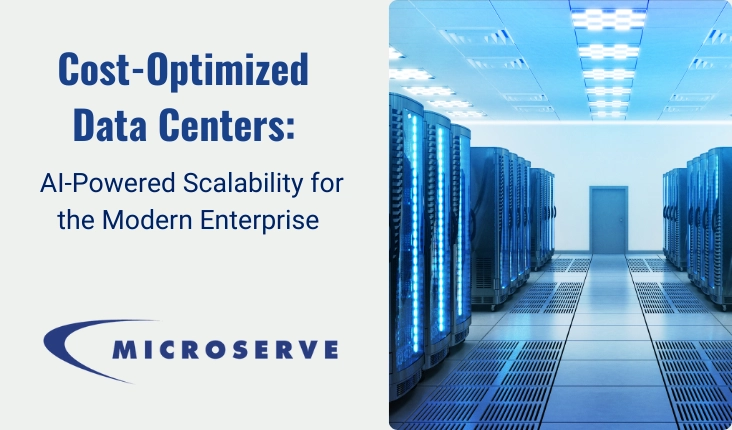In today’s fast-paced, highly-distributed world, staying competitive often hinges on an organization’s ability to harness the full power of cloud computing. Using cloud platforms in the right way offers unparalleled scalability and accessibility, making cloud computing one of the best options for organizations to streamline operations and reduce infrastructure costs while employees continue to work in hybrid conditions.
However, many organizations struggle to manage their cloud resources and don’t know how to optimize their cloud platforms for performance and cost efficiency – leaving them with high operating costs and low utilization. This is why many businesses turn to managed cloud services, which offers a way for organizations to benefit from their cloud investments without needing to hire expensive in-house cloud experts.
In this article, we’ll explore some of the strategies and tactics used by managed cloud service providers to optimize cloud platforms for performance and cost efficiency.
The Rising Significance of Cloud Computing
With the rise of hybrid work models where employees work from home and in the office, accessibility is essential. Cloud computing offers a solution to this by providing a dynamic, scalable environment to host applications, store data, and run services. In 2020, many of the businesses that were forced to update their system and shift to cloud computing eventually experienced a reduction in infrastructure costs, improved resource utilization, and flexible scalability.

However, those without the right expertise gained first-hand experience to the challenges of cloud computing, including:
- Complicated infrastructure: Managing cloud infrastructure can be complicated and time-consuming without the right configurations.
- Unexpected costs: Cloud computing can be a highly cost-effective solution when configured correctly. Otherwise, it can lead to unexpected expenses if not managed correctly.
- Perfecting scalability: Knowing when to scale up or down in response to demand can feed into unexpected costs or poor performance.
- Security and compliance: Hosting your data in cloud environments can be a daunting task, especially when your business is highly regulated by compliance regulations. Knowing how to protect your data in cloud platforms is essential to protecting your data.
That’s why many businesses turned to managed cloud services, which is a service that helps to navigate the complexities of cloud computing.
What Are Managed Cloud Services?
Managed cloud services, typically offered by a managed services partner (MSP), is a service offering that helps businesses manage their cloud infrastructure by managing resources, reducing costs, enhancing cybersecurity measures, and optimizing performance. These MSPs act as a strategic partner, working closely with clients to optimize cloud operations.
Managed cloud providers offer:
- Cloud strategy, consultation, and expertise: Managed service providers work closely with their clients to create a tailored cloud strategy that meets their business objectives and adheres to compliance regulations. Clients benefit from in-depth knowledge of cloud platforms without hiring an in-house cloud expert.
- Cloud migration and provisioning: Migrating your applications and services to cloud platforms can be intimidating. MSPs help you migrate to the cloud and provision your cloud resources, such as setting up virtual machines, storage, networking, or any other necessary components.
- Cloud scalability and cost optimization: Cloud service providers help businesses perfect scalability – advising their clients on the appropriate time to scale up or down to optimize costs.
- Cloud support and troubleshooting: If a problem arises, managed cloud providers help you to pinpoint the issue and resolve the problem quickly.
For these reasons, organizations often rely on their managed IT services partner to help them manage their cloud infrastructure. It helps take the guesswork out of cloud computing and helps optimize performance and cost efficiency.
How to Master Cloud Computing like a Managed Cloud Service Provider
To truly master cloud computing and get your cloud platforms running like a well-oiled machine, you’ll likely need to hire the right talent or work with a managed IT service provider. Bringing in an in-house cloud expert can help you optimize your cloud setup for both top-notch performance and cost efficiency. But, depending on the size of your organization and its needs, this might end up costing you more than working with a managed service provider. Whichever route you decide to take, here are a few strategies and tactics they’re likely to implement.

Implement cost-effective cloud storage solutions
Storage management is an essential element to master to get the most out of cloud computing. To master storage management, start by identifying which data is most frequently accessed and which data is rarely used. This helps you allocate the appropriate amount of storage options to each type of data.
You also need to choose a storage service that offers storage flexibility, like Microsoft OneDrive or SharePoint, to host your data and applications. Additionally, you may look for a cloud provider that offers a tiered storage solution that allows you to move data between storage classes. In some instances, you can automatically transition rarely used data to a less expensive storage class. You may also decide to set up data lifecycle policies that automatically delete or archive data that hasn’t been accessed.
Implement robust security measures to protect data
Maintaining security is of utmost importance in cloud computing, as data may be stored on remote servers with shared infrastructure. Although it is a great solution to cut costs, it can pose a security threat if not properly managed. Using an Identify and Access Management (IAM) solution is a great place to start; it controls who can access your resources. In addition to an IAM solution, you should also implement encryption at rest and in transit to protect your data.

Another tactic used by cloud service providers and cybersecurity experts is to use a Virtual Private Cloud (VPC) to isolate network segments and create network security groups to secure communication between resources.
You should also implement the practice of continuous monitoring to detect potential security threats and respond accordingly. A well-established monitoring system helps with real-time threat detection in cloud environments and lowers your risk of a data breach.
Finally, to maintain security compliance, ensure your cloud environment adheres to the industry-specific compliance standards and regulations that your business faces, and train your employees on the cybersecurity risks associated with cloud computing.
Manage cloud infrastructure and scalability
Implementing auto-scaling policies that automatically scale your resource capacity based on demand is a great place to start when managing your cloud infrastructure. Infrastructure as Code (IaC) principles can help automate the provisioning and management of your cloud solutions.
Another way to manage your cloud infrastructure and scalability is to use containerization solutions like Docker and Kubernetes. It helps to isolate applications and dependencies to a specific package, which ensures applications can run efficiently and simplifies cloud migration.
Optimize for performance
Your cloud expert may implement load balancing or Content Delivery Networks (CDNs) to optimize your cloud performance. Implementing load balancers ensures even traffic distribution across multiple instances, while CDNs help deliver content to users that are from geographically dispersed edged locations.
Finally, to get the most out of your optimization, your cloud expert should regularly revisit their tactics and strategies. With the ever-evolving technological landscape, artificial intelligence and other technological advancements can help improve your cloud performance over time.
![]()
Working with a Managed Cloud Service Provider vs Hiring an In-house Expert
Optimizing your cloud platforms for performance and cost efficiency can significantly reduce your operating costs. At the end of the day, the choice between working with a managed cloud service provider or hiring an in-house cloud expert can hold significant weight. However, the decision should ultimately be guided by your organization’s unique goals.
Working with an MSP can offer significant benefits, as they act as a trusted partner in IT operations, meaning they can take a holistic, strategic approach to your cloud platforms, security, and operations to optimize for performance and cost efficiency. An MSP like Microserve, with over 35 years in business, is dedicated to helping clients create strategies and achieve success with their overall business goals. Microserve brings a wealth of knowledge and a comprehensive approach to cloud strategies.
Ultimately, whichever path you choose needs to achieve the goal of optimizing your cloud platforms, reducing operational costs, enhancing performance, and achieving your overall business objectives.
Get in touch with the experts at Microserve today to learn how you can optimize your cloud platforms to reduce operational costs, boost performance, or achieve other business objectives.




